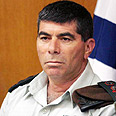
IDF chief: Home front becoming battlefront
Israel's top military man, Gabi Ashkenazi warns home front is becoming part of the battlefront in Herzliya Conference held in Knesset
IDF Chief of Staff, Lt. Gen. Gabi Ashkenazi warned Sunday that Israel's home front was quickly becoming the battlefront.
"In every conflict, the threat on the home front is increasing and it is becoming part of the battlefront. We see this everyday in Gaza Vicinity communities," Ashkenazi said in a speech at the Herzliya Conference, hosted by the Interdisciplinary Center and held at the Knesset.
He added that the IDF operates in Gaza day and night in order to confront this threat.
Ashkenazi that the steadfastness of residents of Sderot and other Gaza Vicinity communities was exemplary.
Ashkenazi also mentioned that a nuclear-armed Iran represented a threat to the Middle East as whole that Israel could not allow.
"The IDF is geared up to deal with the complicated reality of future challenge as well as all essential issues. Among them are learning and implementing lessons learned from the Second Lebanon War: The power of new weapons, readiness to fight, the quality of human resources and taking care of them, the training of the chain of command and more."
Ashkenazi also said that "in order to ensure the existence of the State of Israel as an independent country, democratic and prosperous, we must maintain a strong army that can confront the spectrum of threats."
"We have in front of us a Middle East that is undergoing change. The IDF must be ready for any escalation. The IDF is tasked with dealing with armies, some of which are armed with weapons of mass destruction and terrorist organizations."
The IDF chief stressed that Israeli society must be ready to pay the price for maintaining an army outfitted to meet the threats of tomorrow. In order to do so, he called for the lengthening of national service and for a comprehensive effort to fight the phenomenon of draft-dodging.
President Shimon Peres said in the conference that "all eyes are on the peace process, it is possible that 2008 will be the key year for peace. The destiny of peace is not only thrust upon our opponents but is also for us (to decide). If the ambition for peace unites, the price of peace divides."
Referring to the fighting in the south, the president said that "Gaza is a security problem more than a political one. No one is suggesting that (we) return and settle in Gaza. Logic dictates that we will come to a national agreement on the Gaza issue -- an agreement that will include ways to deal with responding (to attacks from Gaza), fortification, and dealing (Gaza) residents' needs."
Peres called for people to stop being complacent and to have social solidarity. He said that Israel's "social strength is up against some serious tests. First and foremost, a test of the educational (system)…The educational system has been affected by the strike. The government, teachers and employers must meet before additional strikes and come to an agreement over wages for the next five years."
Knesset Speaker Dalia Itzik, said that "the ability to govern in Israel is restricted and we must find ways to enable more stable governing."
She asked people to send blessings to all those operating to defend residents of the western Negev and Sderot whome she described as "those standing under a murderous terrorist attack for seven years. It is the right of residents of the western Negev and Sderot to live in quiet and security and this obligates Israel to let go off the vestiges of its restraint that are left."










